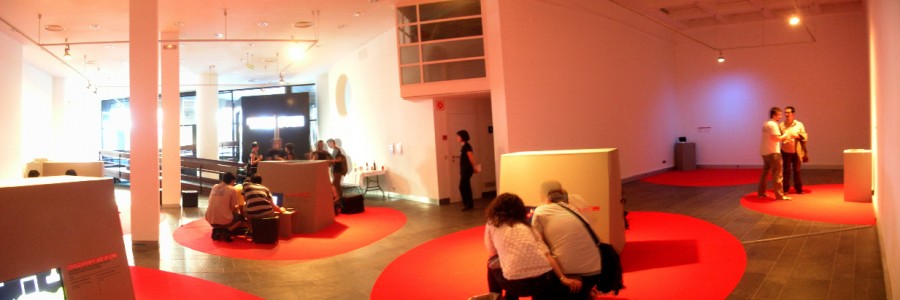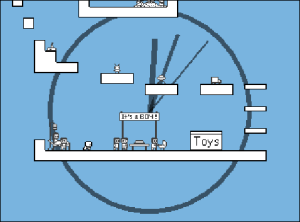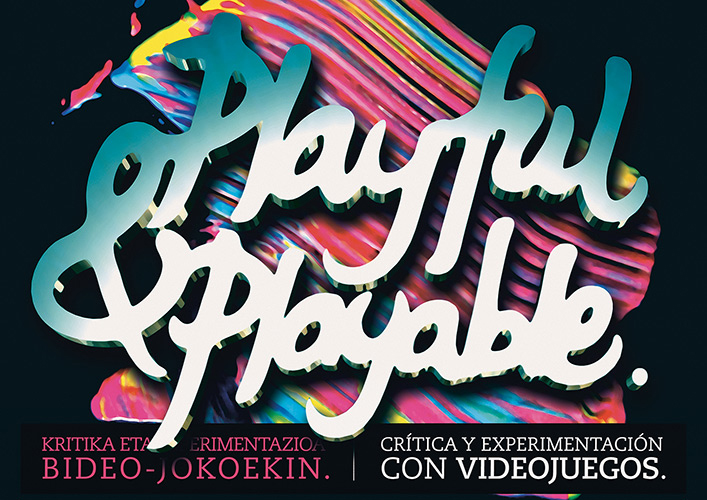
PLAYFUL & Playable is a program of activities addressing the new relationships between the field of video games and contemporary culture, from the position of independent authors, creators and groups.
In these developments outside mainstream and commercial trends, the gaming experience goes beyond the playful subject to settle in the territory of the critical and creative activity.
PLAYFUL & PLAYABLE crítica y experimentación con videojuegos
From june 24th to 15th september 2010
Sala Amárica. Vitoria – Gasteiz. Basque Country.
Opening: june 24th 2010, 19:00 h
Curator: Lara Sánchez Coterón
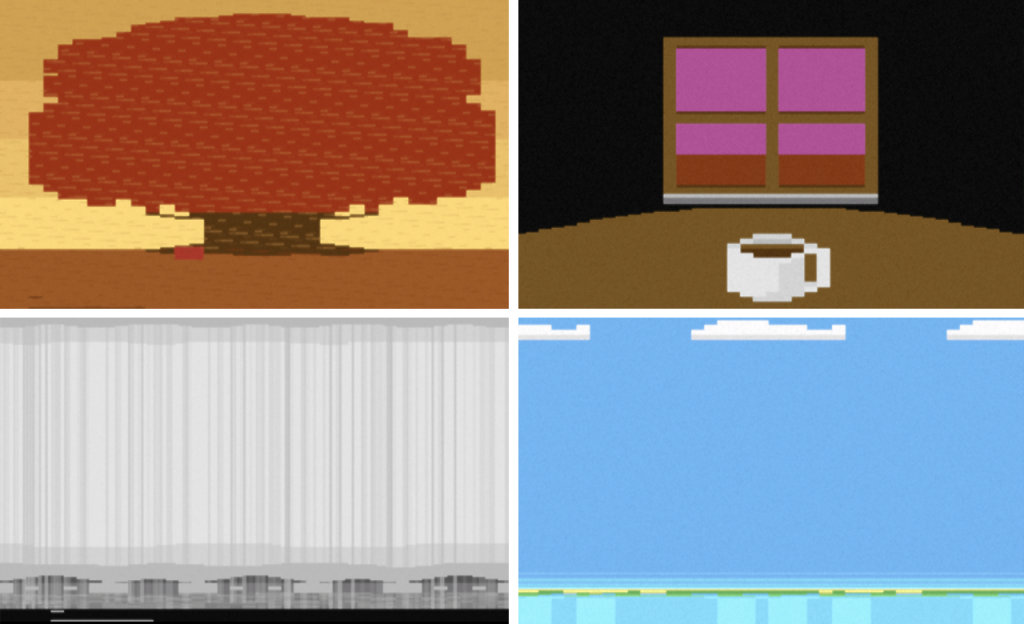
A Slow Year (Ian Bogost, 2010) is a collection of four games, one for each season, about the experience of observing things. These games are neither action nor strategy: each of them requires a different kind of sedate observation and methodical input.
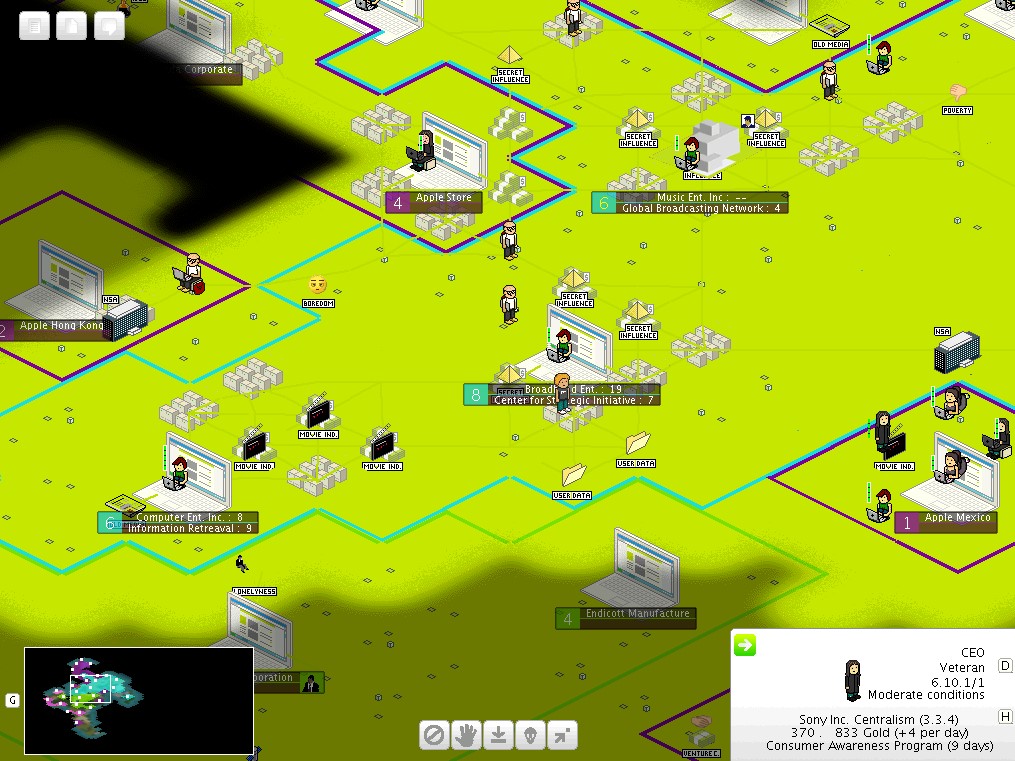
Civilization V – Age of Love (2008). Eastwood – Real Time Strategy Group. In Eastwood’s earlier ‘modification’ of Sid Meier’s seminal computer strategy game Civilization, Civilization IV players took the role of corporate IT big players. This work continues their project of mapping the techno-capitalist tendencies of ‘real-time’ strategy and online worlds. Civilization V – Age of Love (2008) is a game that addresses the competition for dominance between companies working with Web 2.0 technologies, such as Facebook, YouTube, persistently online games such as Second Life and World of Warcraft, social networks, social content aggregators and free labour market. In order to advance through the game, companies are using tactics like ‘Emotional blackmail’, ‘Tribal marketing’, ’Community control management’, ‘Fear’ or ‘Love bombing’. The project is using recent researches and developments in the field of digital economy, online marketing and social networking.
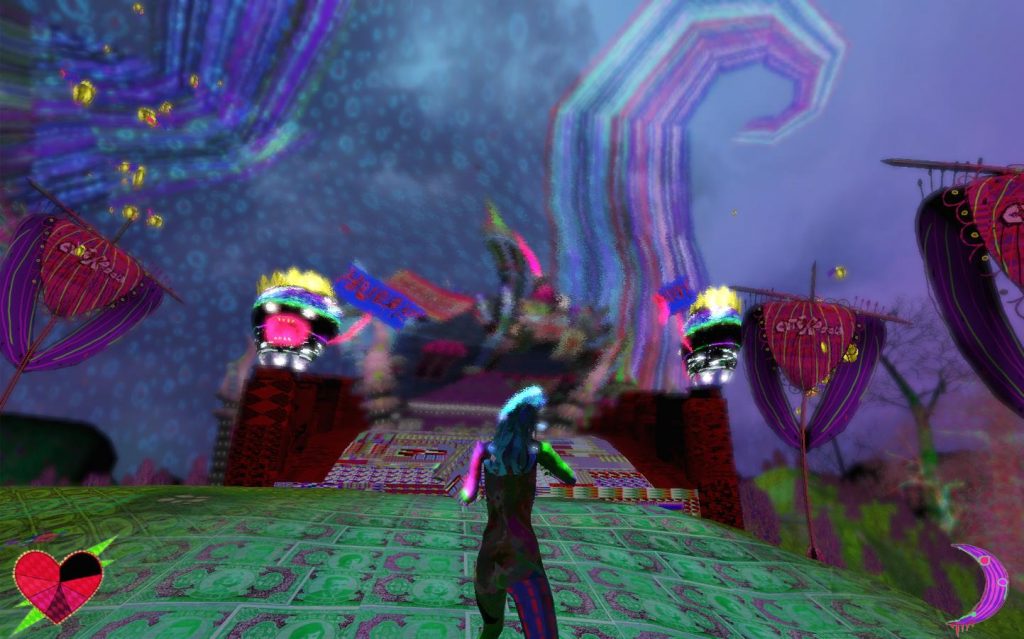
CuteXdoom II (2008). Anita Fontaine y Mike Pelletier. CuteXdoom II is a game modification that transforms Unreal Tournament 3 into a digi-Rococo experience. Players are tasked with the mission of piloting their poisoned character, Sally Sanrio, through a world that is simultaneously cute and sinister in search of the antidote. CuteXdoom II expands the narrative developed in the first instance of the project, wherein Sally Sanrio is drawn to the CuteXdoom cult, which centres around the notion that ‘the possession and worship of cute material objects will ultimately lead to happiness’.

Every Day The Same Day (2009). Molleindustria. A game about alienation and refusal of labour. Every Day The Same Day is a short, bleak tale about a day / dream / nightmare. A faceless one-dimensional man is trapped in the daily routine. His liberation / damnation / awakening only happen when player discovers all the possible avenues of subtle disobedience.

Game Broker (2009). Colectivo Derivart y David Pello. Game Broker reflects upon the nature of financial crises with three retro games with 8-bits aesthetics for the original Nintendo Game Boy. Each of the three games brings the player back to the crises of the 1980’s, 90’s and the dotcom years. The games allow the player to learn about the reasons for each crisis, engage with economic bubbles, and learn key information about them. For instance, it brings up issues such as soaring oil prices in the early 1980’s, the surge in interest rates in beginning of the 1990’s, or the technology stocks during the dot-com bubble. The games challenge the player with questions about each crisis, and correct answers give the player extra points. Game Broker invites the player to rethink the nature of financial crises as a recurring phenomenon during the last decades.

Judith (2009). Terry Cavanagh y Stephen Lavelle. Judith is a first person adventure game set in and around a castle. The game was originally technically motivated, following a quick collaboration in London at a games jam in December 2008 (involving some visual effects). Narrative structure, with spatial and temporal jumps, puts us on the skin of many different characters, the ancient inhabitants of the castle.
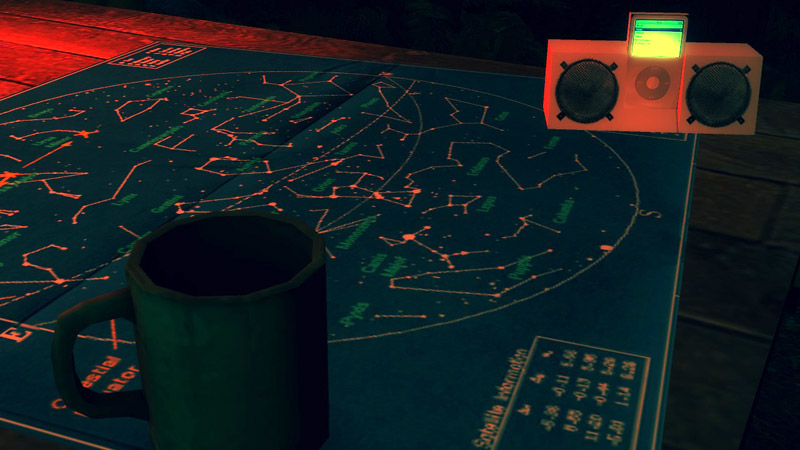
Radiator Issue 1: POLARIS (2009). Robert Yang. You’re stargazing in central California on what could totally be both the lamest and the cheapest date ever. Polaris was an experiment both in having real-life impact (finding Polaris with this technique actually works in real-life throughout the Northern Hemisphere) and in depicting narrator voice. The narrator’s gender is never specified — and this was only possible through text, as a voice over would’ve ruined the effect.
Super Kid Fighter (1998). Carbon Defense League. In 1998, the Carbon Defense League, a collaborative art group, produced a game called Super Kid Fighter for the Nintendo GameBoy. In addition to the game, the group published a development kit complete with software, schematics, and instructions called Child as Audience that featured music by Creation is Crucifixion and spoken word by Critical Art Ensemble. The goal of the project was to reclaim what was then a controlled medium (gaming) to target children with activist content. The game drew it’s inspiration from the writings of Wilhelm Reich and invited a player to discover a free public brothel for people of all ages. The game was uploaded to hacked Gameboy cartridges and reverse stolen to store shelves in place of existing games.
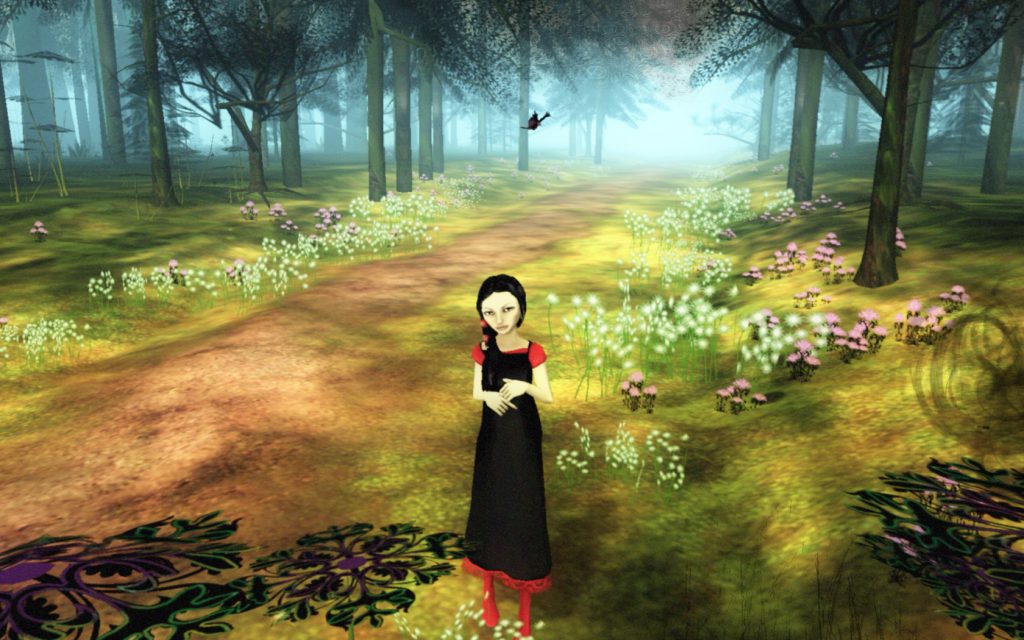
The Path (2009). Tale of Tales. The Path is a short horror game inspired by older versions of Little Red Ridinghood, set in modern day. The Path offers an atmospheric experience of exploration, discovery and introspection through a unique form of gameplay, designed to immerse you deeply into its dark themes. Every interaction in the game expresses an aspect of the narrative. The six protagonists each have their own age and personality and allow the player to live through the tale in different ways. Most of the story, however, relies on your active imagination.

Vigilande 1.0 (2001). Martin le Chevallier. The player faces a series of screens allowing him to watch over many places in the same time: streets, supermarkets, parking lots, shops, apartment buildings, schools, etc. Denouncement is his aim. In a limited time (his work time), he has to point out the most important amount of infractions : robberies, pocket-pickings, breaches of the highway code, trash-abandoning, drug dealing, drunkenness, sexual harassment, etc. Each time the player catch one in the act, his points increase; each time he defames, they lower. Each citizen being a virtual offender, all unpunished infractions increase the rate of amorality of the society. Prevented from using his critical sense by the lure of success, the player faces a double bind.
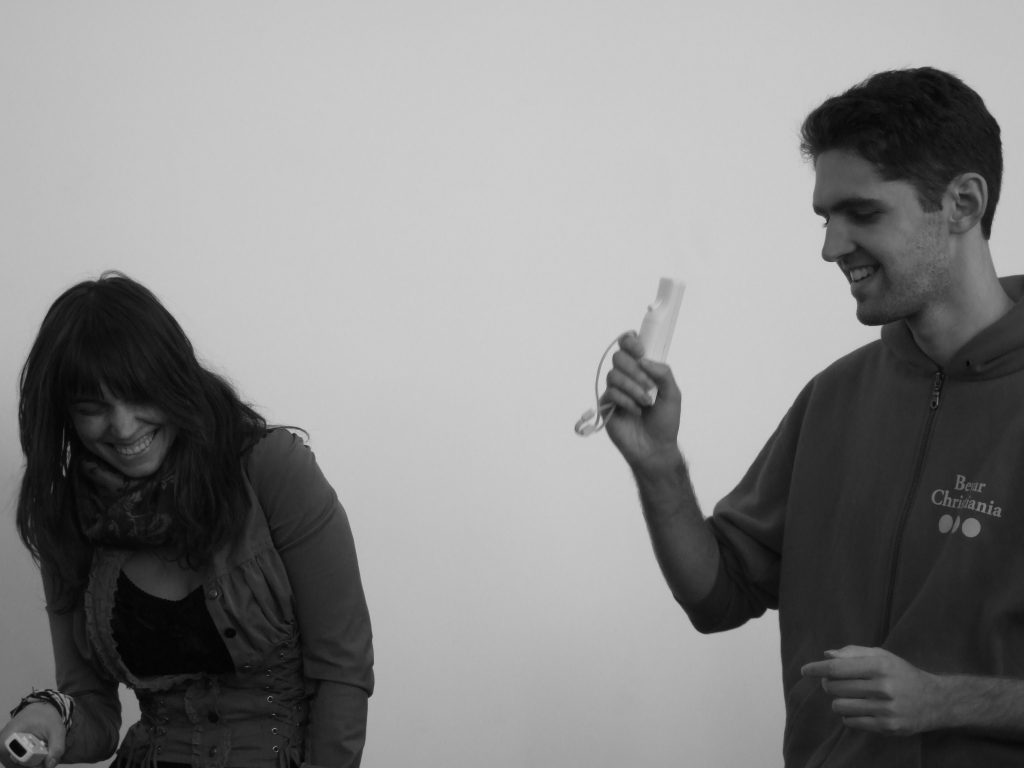
Dark Room Sex Game (2008). Copenhaguen Game Collective. Dark Room Sex Game is a no-graphics erotic rhythm game, played only by audio and haptic cues. The goal is to research climax with your partner, by accelerating at the correct rate. In the four-player mode (available on the group’s website), you need to figure out who your partner is, and then race to reach climax before the other two players.
The program, which will run throughout the second half of 2010 with meetings, workshops, live acts and projections, is looking for prospecting and analyzing videogames as a cultural process, and begins with an exhibition of projects that address the dialogical relationship between player and author- designer-developer on a different perspective.
From the closeness provided by digital content distribution, which avoids unnecessary and sometimes harmful intermediaries for this communication, new types of processes are built that integrate indie playful content and more sophisticated experiences.
Interactive Narrative, which arises from the logical marriage between hypertext stories and the videogame medium, is an emerging way of work within the contemporary community of independent developers. Authors like Terry Cavanagh and Stephen Lavelle in works such as Judith, which we can enjoy at the exhibition, but also in other of his projects like Pathaways; the allegorical narratives of Robert Yang in his series Radiator, the review of classic tales and stories by Tale Of Tales, or even the story of the everyday life monotony presented by Molleindustria (Every day the same dream), are examples of this evolving format.
As with music, the vernacular language of games has a lot to do with synesthesia. There are many feelings that cannot be simulated even in a videogame, but appropriately reasoned, the human brain can complement these gaps. Ian Bogost’s poetic games are a good paradigm of the way in which these new codes are articulating visual synesthetes. These poetic games function as a representation of an idea of the author himself, which the player manipulates. This is an open type of game in which the author doesn’t guide us through particular or highly defined experiences. He offers abstraction and condensation of symbols and concepts, leaving the way open to the unique experience of each player.
In addition we review a more committed kind of productions within the scope of technologically mediated games. Continuing the task of mapping existing social models, the reformulation of Sid Meier’s Civilization (2) by Kristian Vladan Lukic and Joler (Eastwood – Real Time Strategy Group) which yield within the criticism current that distinguishes itself from the broad and sometimes ambiguous label of the so called serious games (3). We can even get out of the limited structures of the most orthodox definition of play to meet projects as Vigilance 1.0 (Martin le Chevallier), in which through the claim of entertainment we are playing the role of a judgmental big brother with ubiquitous stare.
Without leaving the pragmatic style of this body of works, but without losing the playful tone of the entire exhibition, Derivart group with David Pello have added to their Gamebroker project a vector of education commitment and discussion about certain socio-economic events, using a device so innocent a priori as a series of mini games for Gameboy.
And after those relevant and sublime experience we also review subversive and fun projects that militate within the most uncomfortable and sharp irreverence such as Super Kid Fighter (Carbon Defense League) and Dark Room Sex Game of Copenhagen Game Collective, even the LSD experience of CuteXdoom (Anita Fontaine and Mike Pelletier).








